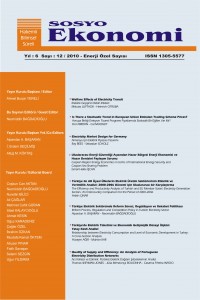Öz
The liberalization of the European electricity market facilitating the cross-border exchanges of electricity requires the establishment of a system for accessing the European grid. The starting point for the discussion of pricing the access to interconnected networks in this paper is the fact that electricity transit creates external effects to the involved countries which have to be internalized. Using a three countries model we analyze the welfare effects of different compensation scenarios for the electricity transfer between countries under individual and joint welfare maximization. The three countries have different roles: country 1 is an electricity exporting country, country 2 is importing electricity from country 1 and country 3 is the transit country. Individual and joint maximization deliver identical results if and only if export prices and transit charges are equal to marginal production and marginal transit costs. The joint optimum implies that the demand for imported electricity is determined by the sum of all relevant marginal costs: marginal production cost and marginal electricity loss in the export country, marginal transit costs and marginal electricity loss in the import country. The transit country has to be compensated for its electricity loss costs on the basis of marginal costs. Capital costs of transit capacity should only be compensated in the case of capacity shortage in the transit country.
Anahtar Kelimeler
Kaynakça
- Christie, R.D. & Wollenberg, B.F. & Wangensteen, I. (2000), “Transmission Management in the Deregulated Environment”, Proceedings of the IEEE, Vol. 88, No. 2, February, pp. 170-195.
- Daxhelet, O. & Smeers, Y. (2003), “Cross-border trade: A two-stage equilibrium model of the Florence Regulatory Forum”, Proposals, Full Paper.
- Daxhelet, O. & Smeers, Y. (2007), “The EU regulation on cross-border trade of electricity: A two-stage equilibrium model”, European Journal of Operational Research, 181, pp. 1396-1412.
- European Commission, Legislation, Publications, Document and Reports on the internal Electricity Market, 1996-2003.
Öz
The liberalization of the European electricity market facilitating the cross-border exchanges of electricity requires the establishment of a system for accessing the European grid. The starting point for the discussion of pricing the access to interconnected networks in this paper is the fact that electricity transit creates external effects to the involved countries which have to be internalized. Using a three countries model we analyze the welfare effects of different compensation scenarios for the electricity transfer between countries under individual and joint welfare maximization. The three countries have different roles: country 1 is an electricity exporting country, country 2 is importing electricity from country 1 and country 3 is the transit country. Individual and joint maximization deliver identical results if and only if export prices and transit charges are equal to marginal production and marginal transit costs. The joint optimum implies that the demand for imported electricity is determined by the sum of all relevant marginal costs: marginal production cost and marginal electricity loss in the export country, marginal transit costs and marginal electricity loss in the import country. The transit country has to be compensated for its electricity loss costs on the basis of marginal costs. Capital costs of transit capacity should only be compensated in the case of capacity shortage in the transit country.
Anahtar Kelimeler
Kaynakça
- Christie, R.D. & Wollenberg, B.F. & Wangensteen, I. (2000), “Transmission Management in the Deregulated Environment”, Proceedings of the IEEE, Vol. 88, No. 2, February, pp. 170-195.
- Daxhelet, O. & Smeers, Y. (2003), “Cross-border trade: A two-stage equilibrium model of the Florence Regulatory Forum”, Proposals, Full Paper.
- Daxhelet, O. & Smeers, Y. (2007), “The EU regulation on cross-border trade of electricity: A two-stage equilibrium model”, European Journal of Operational Research, 181, pp. 1396-1412.
- European Commission, Legislation, Publications, Document and Reports on the internal Electricity Market, 1996-2003.
Ayrıntılar
| Birincil Dil | İngilizce |
|---|---|
| Bölüm | Makaleler |
| Yazarlar | |
| Yayımlanma Tarihi | 1 Eylül 2010 |
| Gönderilme Tarihi | 12 Aralık 2014 |
| Yayımlandığı Sayı | Yıl 2010 Cilt: 12 Sayı: 12 |


